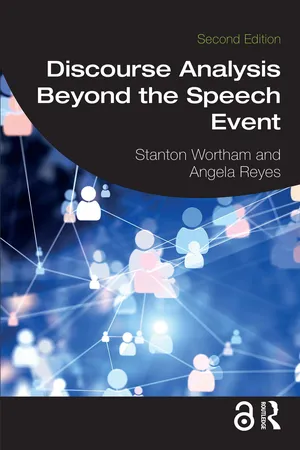
- 238 pages
- English
- ePUB (mobile friendly)
- Available on iOS & Android
Discourse Analysis Beyond the Speech Event
About this book
In its first edition, winner of the 2016 Edward Sapir Book Prize from the Society for Linguistic Anthropology of the American Anthropological Association
Discourse Analysis Beyond the Speech Event introduces a new approach to discourse analysis. In this innovative work, Wortham and Reyes argue that discourse analysts should look beyond fixed speech events and consider the development of discourses over time. Drawing on theories and methods from linguistic anthropology and related fields, this book is the first to present a systematic methodological approach to conducting discourse analysis of linked events, allowing researchers to understand not only individual events but also the patterns that emerge across them.
This new edition:
- Draws on theories and methods from linguistic anthropology and related fields;
- Presents the first systematic methodological approach to doing discourse analysis of linked events;
- Provides easy-to-use tools and techniques for analyzing discourse both within and across events;
- Offers transparent procedures and clear illustrations to show how the approach can be applied to analyze three types of data: ethnographic, archival, and new media;
- Includes a new chapter focusing on the discourse analysis of contemporary nationalist new media data.
Updated and revised for the second edition, this book is essential reading for advanced students and researchers working in the area of discourse analysis.
Tools to learn more effectively

Saving Books

Keyword Search

Annotating Text

Listen to it instead
Information
1
Discourse analysis across events
An example
Segment 1: Tyisha’s cat as a beast
525 | TYI: | Mrs. Bailey? I- I have to disagree |
((class laughter)) | ||
T/B: | can I- can I finish this before you disagree, okay. the idea that he’s putting out here is that they- they have goals, and that they can in discussion decide the best way to accomplish their goal. now, Tyisha what’s your | |
530 | disagreement? | |
TYI: | becau(hh)- because if a- like- if my- okay, if my cat want to- um you know to get to the top of something, you know, he might sit there and be ((3 unintelligible syllables)) and he’ll sit there and try every day. and then finally he will do it, that was the goal to try and get up there. he had a goal. | |
535 | T/B: | okay (1.0) he’s got a [goal but |
ST: | [was his goal really necessary? ((laughter from class)) | |
T/B: | let’s- let’s- let’s take what- (3.0) let’s take what your cat’s doing that every day he sees that- counter that he wants to get on, and every day when he passes that counter he tries to get up there. that’s a goal. okay[= | |
540 | ST: | [yeah. |
T/B: | =how is that different than your goal, the goal that you might have had last night when you had this reading, or- ((some chattering)) | |
TYI: | ˚I don’t know˚ |
Table of contents
- Cover
- Half Title
- Title Page
- Copyright
- Dedication
- Table of Contents
- List of figures
- List of tables
- Acknowledgments
- 1 Discourse analysis across events
- 2 Central tools and techniques
- 3 Discourse analysis of ethnographic data
- 4 Discourse analysis of archival data
- 5 Discourse analysis of new media data
- 6 Discourse analysis of contemporary nationalist new media
- 7 Conclusions
- Appendix A: Transcription conventions
- Appendix B: Abbreviations of names in Wortham transcripts
- References
- Index
Frequently asked questions
- Essential is ideal for learners and professionals who enjoy exploring a wide range of subjects. Access the Essential Library with 800,000+ trusted titles and best-sellers across business, personal growth, and the humanities. Includes unlimited reading time and Standard Read Aloud voice.
- Complete: Perfect for advanced learners and researchers needing full, unrestricted access. Unlock 1.4M+ books across hundreds of subjects, including academic and specialized titles. The Complete Plan also includes advanced features like Premium Read Aloud and Research Assistant.
Please note we cannot support devices running on iOS 13 and Android 7 or earlier. Learn more about using the app